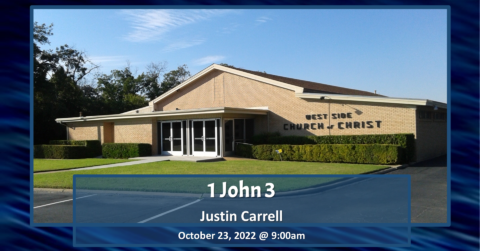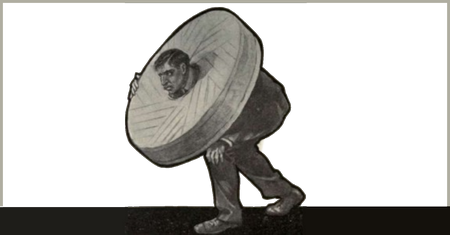Category: Sin
Subject: Sin
Abundant Grace

The apostle Paul was always quick to acknowledge from where he came. He was a Pharisee, and one who sought to do violence to those who followed Jesus. He serves as a significant witness of the Christ, as one who formerly fought against Jesus, who became His Savior.
Paul knew that his position as one of the redeemed came despite the evil he did as a young man. One of the places where he made this clear is in his first letter to Timothy. In the first chapter, he wrote the following: Continue reading “Abundant Grace” →
The Process of Temptation

In James 1:12-15, the Lord expresses the process that occurs that leads to temptation, and if is not checked, ends with eternal death.
Following is the passage: “Blessed is the man who endures temptation; for when he has been approved, he will receive the crown of life which the Lord has promised to those who love Him. 13 Let no one say when he is tempted, “I am tempted by God”; for God cannot be tempted by evil, nor does He Himself tempt anyone. 14 But each one is tempted when he is drawn away by his own desires and enticed. 15 Then, when desire has conceived, it gives birth to sin; and sin, when it is full-grown, brings forth death.” Continue reading “The Process of Temptation” →
Sermon: The Inclination to Sin

A discussion of man’s inclination to sin and how it can be mitigated.
Sermon Powerpoint View and Download:
<<———><><———>>
The Depraved Mind

In the beginning of his letter to the Romans, Paul described a culture that had forgotten God. They no longer glorified Him, had darkened hearts, and so were given up to uncleanness by the Creator.
This purposeful rebellion and its descent into ignorance led men to engage in despicable behavior. Paul especially noted the depraved nature of their sexual appetites. They dishonored their “bodies among themselves” (1:24) through homosexual acts. Paul described it as “vile passions” (1:26). “For even their women exchanged the natural use for what is against nature. Likewise also the men, leaving the natural use of the woman, burned in their lust for one another, men with men committing what is shameful, and receiving in themselves the penalty of their error which was due” (1:26-27).
The Consequence of Sin

The prophet Obadiah declared the coming of judgment against Edom because of her sins against “your brother Jacob.” Edom thought herself safe. “The pride of your heart has deceived you, you who dwell in the clefts of the rock, whose habitation is high; you who say in your heart, ‘Who will bring me down to the ground?”’ (3). But, this judgment was inexorable, “‘From there I will bring you down,’ says the Lord” (4).
Why was Edom guilty? Notice the following phrases used in the text. “But you should not have” (12); “Nor should you have” (12); “You should not have” (13); etc., etc., etc.
These phrases indicate the concept of consequence. You should not have… because this is the result! A result they did not desire, and would not appreciate. As Obadiah wrote, “As you have done, it shall be done to you; your reprisal shall return upon your own head” (15).
In conclusion, Obadiah wrote, “Then saviors shall come to Mount Zion to judge the mountains of Esau, and the kingdom shall be the Lord’s” (21).
There is much to be learned here. God’s will is inexorable. What He desires to occur on earth will happen. God’s people will be blessed, and the ungodly will suffer the consequences (cf. 2 Thessalonians 1:3-10). Sin always has unpleasant ramifications. From Adam to eternity, God has and will deal with the transgressions of men. To avoid judgment, we “should not” sin against God.
Sermon: The Destructive Path of the Sinner

Just as a tornado leaves a path of destruction in its wake, the sinner leaves destruction to himself and others, everywhere he goes.
Sermon Powerpoint View and Download:
<<———><><———>>
Sermon: The Curious Case of Simon the Sorcerer
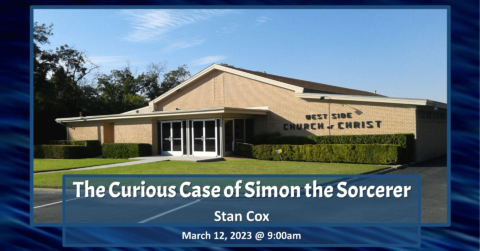
A discussion of Simon’s conversion, and the sin he committed following, taken from the text of Acts 8.
Sermon: Good, Better, Best
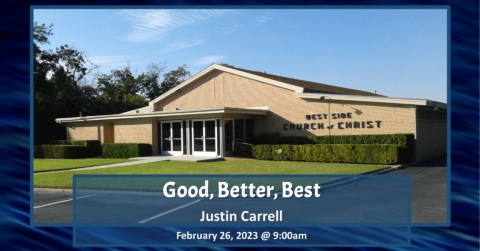
In this lesson, Justin explains a good (though radical) way to deal with sin, and even better way to deal with it, and then discusses the best way to handle the issue of sin.
“Men with the same nature as you”
A superstitious population in Lystra sought, with the blessing of a pagan priest, to worship Paul and Barnabas. Paul had healed a man who was crippled from the womb. As a result, the people began to call Barnabas, Zeus, and Paul, Hermes “because he was the chief speaker” (Acts 14:12).
Paul and Barnabas’ response is enlightening. They tore their clothes, ran to stop the worship, and said, “Men, why are you doing these things? We also are men with the same nature as you, and preach to you that you should turn from these useless things to the living God, who made the heaven, the earth, the sea, and all things that are in them” (Acts 14:15).
What was meant by the words, “men with the same nature as you”? Simply that they weren’t different. This is important. All men are the same, in the eyes of God. Each are equally guilty because of the sins they have committed (Romans 3:23). All are equally dependent upon God’s grace for salvation (Ephesians 2:8-9). All have been granted access to “repentance to life” by God (Acts 11:18). All who come to Christ are considered of equal value (Galatians 3:28). All who practice ungodliness will suffer the same fate (Romans 1:28-32).
With that known, no man is worthy of worship. No man is to be respected and feared above God Himself (Matthew 10:28). Instead, as Paul and Barnabas exhorted those in Lystra, we must all turn “to the living God” (Acts 14:15).
Click below to…
Sermon: 1 John 3
Sermon: My Will VS Thy Will

Stan discusses the concept of free will. Using the events in the Garden of Eden, and then in the Garden of Gethsemene to show the consequences of the choices we make.
Sermon Powerpoint View and Download:
Sermon: The Names of Sin
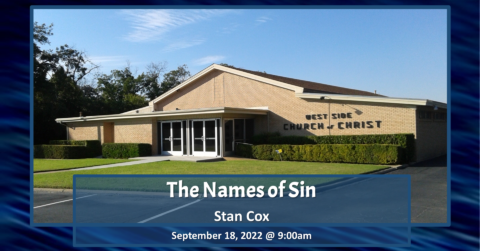
There are many different synonyms used in scripture to capture the concept of sinfulness. An examination of some of these is a helpful exercise.
Sermons: And Such Were Some of You
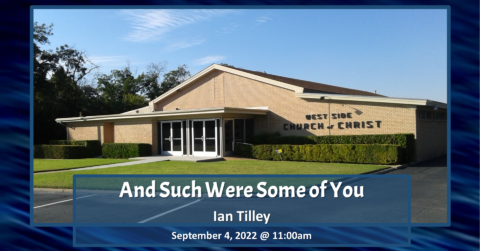
Ian Tilley discusses the state of sin as men transgress God’s laws, and assures that no matter the sin, forgiveness is possible for all.
Lessons from a Millstone
We speak of God’s word as sublime. In this we acknowledge both that the word of God is understandable, and that it is unfathomably deep and productive as we study it each day. The simplest of babes can derive from it the “words of eternal life” (John 6:68), and yet the ablest of students can spend a lifetime of learning from it each day.
Lessons can be learned from unexpected places. For example, we can learn much from the Bible’s reference to the millstone. The millstone was extremely important in ancient times. To turn grain into flour, the grain would be crushed into powder between two heavy stones. Smaller versions of such stones were found in the homes of the people. Larger stones were fashioned in ancient societies to increase production. Regardless, as the Bible refers to such millstones, there are three thoughts to keep in mind. First, they were necessities. Second, they were hard. Third, they were heavy. With this in mind, consider the following truths:
“Woe to Him”
On the matter of offenses Jesus said, “It is impossible that no offenses should come, but woe to him through whom they do come! 2 It would be better for him if a millstone were hung around his neck, and he were thrown into the sea, than that he should offend one of these little ones” (Luke 17:1-2). It can be said that Jesus is not happy with those who offend others.
But, what is it that Jesus refers to as an offense? The words is found a total of 15 times in the New Testament. In the KJV of the Bible, the term is translated offence (9x), stumbling block (3x), occasion of stumbling (1x), occasion to fall (1x), thing that offends (1x).
Thayer defines the term, (skandalon) – a trap, snare; any impediment placed in the way and causing one to stumble or fall.
So, Jesus frowns upon the one who would cause another to stumble or fall — that is, to sin against Him. It is bad enough when we ourselves sin, but if we lead others to sin, “woe to him”!
We should think of this when considering the proper attitude we should have toward those who teach error. When we think about teaching others ourself. When we consider how our actions will affect or influence others. As parents and grandparents as we consider our children and grand-children are watching us closely, and learning from our words and actions. Offenses will certainly come, but “woe to him through whom they do come!”
Click below to…





